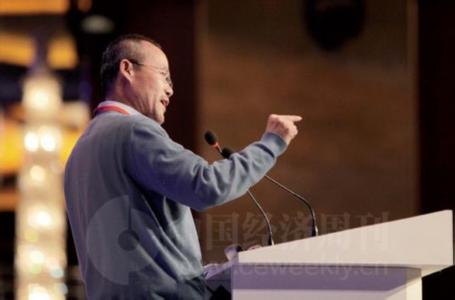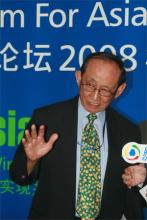摘要:在最受尊敬企业中,我们能发现很多熟悉的国际著名的企业,例如Hewlett-Packard, Intel, Volkswagen, Siemens, Wal-Mart, Microsoft, General Motors, Samsung, Nokia, Motorola, and Coca Cola,还有熟悉的中国企业,例如海尔,平安,华为。有一个企业,对于中国人来说是再熟悉不过了,可是并不是全世界的人都认识,她就是万科。文章描述了万科,王石以及企业公民理念。
Good corporate citizenship in China: Wang Shi and Vanke
Several weeks ago (CSR Asia Weekly, Vol. 1, Week 10, p. 15), we translated a list of the 50 most admired enterprises in China. Amongst this list were some of the biggest foreign names in China: Hewlett-Packard, Intel, Volkswagen, Siemens, Wal-Mart, Microsoft, General Motors, Samsung, Nokia, Motorola, and Coca Cola. On the Chinese side, large enterprises like Haier, Chunlan, Lenovo, TCL, Ping An Insurance, and Huawei were also represented. Most of the Chinese companies are well known aboard and dominant in their respective sectors, either domestically (like Ping An) or overseas (like TCL and Haier). However, one company on the list, Vanke, is probably not so well known outside of China.
Vanke was formed in 1984 and its core business consists of property management, development and sales. It has been engaged in property development since 1988 and was among the first wave of developers selling residential real estate in China.
Vanke’s current Chairman, Wang Shi, was born in 1951. In 1994 he was awarded his first Golden Bull Prize as Shenzhen’s Outstanding Entrepreneur, an award he won again in October 2001. In the same year he won the title of Master Sportsman, issued by the National Physical Culture Bureau for his pre-eminence in mountaineering, and in May 2003 climbed Mt Everest as a member of a Chinese team (becoming the oldest citizen of the PRC to stand atop the peak). In 2004, he was one of the nearly 100 founders of ALASAN SEE (Society Entrepreneur Ecology) Foundation to protect the environment.

Vanke won the Chinese Most Admired Companies award in 2002 and 2003 and was one of the final 50 enterprises selected to move through to the final round in 2004. It was one of the companies named in the Asian Best Corporate Governance Award 2004 hosted by Asiamoney. Vanke took out a Best Corporate Citizenship in China 2004 award, hosted by 21st Century Economy Newspaper and 21st Century Business Review. The six criteria by which companies were judged were i) corporate governance and moral values, ii) protection of workers’ rights, iii) environment protection, iv) public charity, v) supply chain management, and vi) consumer rights. Among the twelve winners of the award were companies like Nokia, Ford, GE, Cicso, BP, Motorola, Canon, Ping An Insurance, and UTStarcom. Vanke was the only local non-state enterprise in the group.
One of Vanke’s core missions is to undertake more social responsibility. Wang Shi believes his company has had limited ability in the past with regard to corporate governance, moral values and respecting people. However, he thinks that it is time for the company to consider how to do more things from now on. Wang has developed a research department with the sole objective to consider how much of its profits the company should utilise each year to being a good corporate citizen. It makes decision on how much money should be set aside for the environment, social development, and so on, and how Vanke can do CSR better and more efficiently. Wang Shi believes companies have more resources and more complicated relationships with other parties in society than inpiduals and are thus in a better position to undertake more responsibility than inpiduals. Wang has written corporate citizenship into the next Vanke’s next 10 year plan, and it has been adopted by the board and employees.
As a real estate developer, Vanke works in a sector rife with problems associated with paying wages in arrears. The Chinese government and media have focussed on this issue a great deal over the last couple of years, with the former trying hard to ensure that migrant workers receive pay owing (particularly in the lead up to Lunar New Year). Vanke therefore finds itself dealing with numerous construction companies where such problems means it is now responsible for every worker on its construction sites.
In December 2003, Vanke’s project management and finance departments sent out notices to each construction company to request that construction workers be paid all wages in full. In January 2004, project management, finance, auditing and the legal departments jointly developed and implemented polices and regulations to prevent problems of back pay. Vanke asked construction companies to sign agreements stipulating that if wages weren’t paid in full and on time, Vanke had the right cancel the contract and pay construction workers directly by using construction project funds. At the time, Vanke General Manager, Yu Liang, said that although the company didn’t have a direct legal relationship with migrant construction workers, it had a moral responsibility to ensure workers received wages.
Being a good corporate citizen in China’s construction sector will be tough for any company due to the complicated relationships between developers, construction companies and contractors. But it seems Vanke has made a good start.
此文章出自 CSR·Asia:企业社会责任亚洲 ,点击这里进入 CSR·Asia:企业社会责任亚洲 的专栏。 爱华网
爱华网



